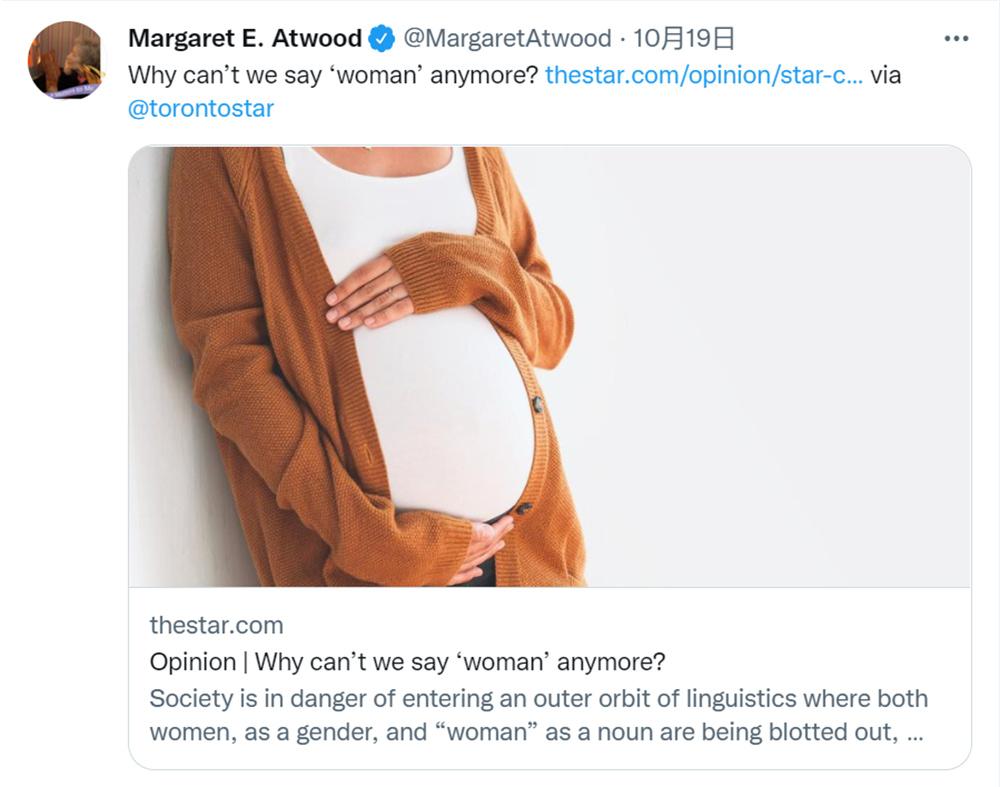The Paper's reporter Cheng Qianqian compiled
Margaret Atwood has over 2 million followers on Twitter. That means more than 2 million people may have seen an anti-transgender article recently shared by the writer known for his novel The Handmaid's Tale.
"Why can't we say 'woman' anymore?" The title of the article is Atwood's tweet.

Atwood Twitter screenshot
Because of this tweet, some social media users have put her in line with Harry Potter author J. Lee. K. Rowling falls into one category. Many consider Rowling to be a TERF (radical feminist who excludes transgender). But others have backed Atwood, including defenders of the right who are unlikely to approve of her.
Atwood recommended the article by Rosie DiManno, which was published In the Toronto Star on Oct. 15. The text reads: "'Woman' is in danger of becoming a dirty word ... Removed from official vocabulary, removed from medical vocabulary, removed from conversation. She blamed "the inappropriate evolution of language" and "the proliferation of transgender radicalism," juxtaposing examples of "women" not being used in other terms. Di Mano argues that behaviors that try to accommodate — such as using "pregnant people" instead of "women" to express respect for transgender men and non-binary people — actually erase women from the conversation.
Dimano also said her article was not "an argument against gender self-identity." She supports LGBTQ+ equality and also supports J. K. Rowling defends.
In the face of people's dissatisfaction, Atwood responded: "Read her article, she is not a TERF. ”
Atwood's support for the article caused an uproar among the transgender community, and at a time they were still shocked by Dave Chappelle's Netflix filming a transgender-phobic special.
Proponents of the transgender community say atWood's choice to share the article is just one of many incidents that threaten the survival of the community, a warning against transgender legislation and anti-transgender sentiment.
"Atwood's recent tweets were disappointing, but not unexpected," said Lydia M. Thompson, a disability justice advocate. X. Z. Brown said, "Discrimination and hostility toward transgenderness is widespread in society, just as discrimination and racism against people with disabilities." Unfortunately, many people from the privileged class mistakenly believe that any increase in visibility or attention from marginalized communities is an attack on them, a point echoed in the article atewood shared. ”
Florence Ashley, a jurist and bioethicist in Toronto, Canada, was wary of Atwood's remarks. "If people don't share this lack of research and argument op-eds, it's very difficult to get people to understand that transgender people's rights aren't taking away the rights of cisgender women," Ashley said.
Now, there are still concerns about whether Atwood will follow the example of other famous writers such as J. Kelly. K. Rowling) back road, showing fear of transgender people.
Editor-in-charge: Cheng Yu
Proofreader: Zhang Liangliang